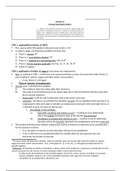Samenvatting
Summary Article 15 OECD MC (EXAM SCHEMES)
Worried for the exam? No time to prepare well structured notes to bring with you? No problem. These schemes are intended to provide a step-by-step approach to each and every topic covered. They will enable you to save time and answer comprehensively to all exam questions. They combine: (i) lecture ...
[Meer zien]




